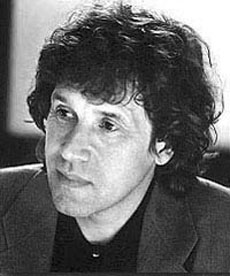
ANGEL
Ireland, 1982, 92 minutes, Colour.
Stephen Rea, Veronica Quilligan, Ray Mc Anally, Donal Mc Cann, Maire Keen, Gerald Mc Sorley.
Directed by Neil Jordan.
Angel is the feature debut of Irish novelist-screen-writer-director Neil Jordan. He draws on the experience of political troubles in Ireland, of the transitions in Irish society and the influence of the rock culture. While the film has all the ingredients of a vengeance thriller, there are underlying levels of explorations of characters and themes. The action itself becomes a symbol of the troubles in Ireland.
Jordan uses Irish locations well with a blend of realism. and surrealism. Music is an important ingredient - for the plot as well as for characters. The film has an ironic title - audiences trying to identify who are angels and what kind of angels they are.
Neil Jordan went on to collaborate with novelist Angela Carter in directing the film version of some of her stories, the blend of realism and fairy tale, A Company of Wolves.
1. The impact of this Irish film? Entertainment? Message? Authentic?
2. The work of writer-director Neil Jordan, his first film, his fresh and vigorous approach? Imagination?
3. Location photography, contemporary atmosphere, the real Ireland, the world of Dreamland, the surreal elements to highlight the significance of the conventional plot? Pace and editing? The music, jazz score, saxophone music - for mood, situations, characters?
4. Audience knowledge of and response to Ireland and its troubles? Contemporary gangsters and protection? Murders? Violence? The corruption and violence in this plot as symbolic of what is happening in Ireland?
5. The focus of the title and its meaning? A range of angels: avenging angels, cherubs, sweet angels, guardians, messengers? The central characters and their relationship to angels? Angels as bearers of news, harbingers of death? The apocalyptic aspects of angels - and the Irish situation? Angels, heaven and music?
6. The film's use of the conventions of the vengeance thriller? The action sequences and their effectiveness? Action themes? Audience response to the characters within this framework? In the Irish situation?
7. Dreamland and its atmosphere? The opening in the dance world? The characters within this world? Violence erupting there? The destruction of Dreamland?
8. Danny (Boy) as the central character? As a person, within the group, his music, his innocence? His encounter with Annie, her death, his concussion? His subsequent behaviour as in a dream, a nightmare? His being stunned, the clues about the shoes? His continuing his work? The hospital experience? The recuperation with his Aunt Mae? The detectives and their interrogation? His decision to track down the assassins? The thriller techniques as he identified each killer, confrontation, death? The death wish of one of the killers? His wife and the estrangement, her offering clues from the dance? The encounter on the farm with Mary? Her help? Using his gun to kill herself? The killing of the protection money collector? The revelation that Bonner was the mind behind the racket? Bloom as his guardian angel in protecting him?
9. Annie as a real character and as a symbol? The victim? Innocent, deaf? The cause of all the subsequent violence because of Danny's desire for vengeance?
10. Deirdre and the music world, her relationship with Danny, her work, her response to his actions? The comparisons with his ex-wife?
11. Bloom (echoes of James Joyce's Ulysses) and Bonner as police, the police image, the interrogations, one corrupt and the other the saviour?
12. The world of money, protection, the band, the collectors, the inherent violence?
13. Mary, alone on the farm, her history, helping Danny with the haircut etc., the drama of her killing herself with his gun?
14. The use of the thriller genre for a journey into contemporary Ireland? An vocative symbol of the troubles?